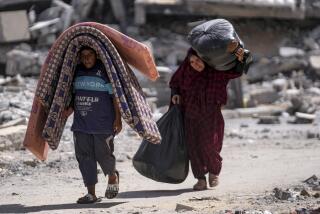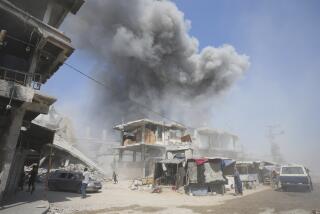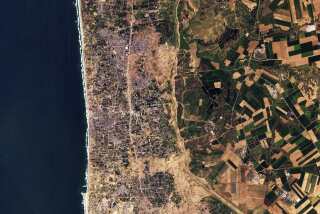Allies Double Size of Iraq Safe Zone : Refugees: The U.S.-led effort pushes east to set up more camps. Kurds volunteer to help. Some leaving the mountains encounter problems with Kurdish guerrillas.
DIYARBAKIR, Turkey — Springing from a rapidly expanding tent city near the border town of Zakhu, allied marines and paratroopers probed deeper into northern Iraq on Sunday as they moved to double the size of a haven where they promise to shelter and protect half a million refugees.
Diplomatic sources here said the move marked the second stage of a plan that will center camps for refugees around three towns in northern Iraq.
“From the beginning, the idea has been to move further east to establish more camps once the Zakhu area was secure,” said one American official here. The second set of camps for the mostly Kurdish refugees will be built near the village of Amadiyah and the third set near Dahuk, he said.
Following the pattern established at Zakhu last week, camps on their outskirts would require allied control of Amadiyah, about 75 miles east of Zakhu, as well as Dahuk, about 30 miles southeast of the original camp.
No clashes were reported as elite American, British and French units pushed east from Zakhu toward securing what will eventually become an area of about 1,350 square miles in northern Iraq that will be off limits to Iraqi forces--double the area in which the allied troops had been operating.
When a company of British marines moved into one village east of Zakhu late Saturday, a battalion of the Iraqi Republican Guard moved out, British officers said.
U.S. Marines will clear the area around Amadiyah to make possible the construction of a camp there, Army Lt. Col. Jim Christophersen of Green Bay, Wis., told reporters in Zakhu on Sunday.
“This will effectively double the size of the security zone,” Christophersen said.
In Washington on Sunday, a Defense Department spokesman said that expansion of the secure zone does not represent any shift in allied strategy. He said the allied forces had never specified how large the protected area would be.
Expanding the secure area “is a continuing process. . . . You start with one camp, then you expand it to two and three,” said the spokesman. “You can’t fit all these people into one small area.”
The United States, which is spearheading the unprecedented humanitarian effort, hopes that many of the refugees who lived in the protected area will bypass new camps and return directly to their homes when they leave the squalid mountain perches along the Iraqi-Turkish border where many of them have been trapped for almost a month.
“We’ll have to extend the security zone as far as we feel is necessary to give adequate protection,” Brig. Andrew Keeling, the commander of British marines in northern Iraq, told reporters at the Zakhu camp.
Around 250 more Kurds came in buses to the Zakhu camp Sunday, about 10 miles from the Turkish border, to join a work force that will total 1,000 young Kurdish men within the next few days.
The camp, with about 1,000 blue-and-white tents already in place, received its first visit Sunday from officials of the United Nations, which has agreed to take over operations of the encampments throughout the haven zone.
All volunteers, the Kurdish workers will help extend the camp, and, American officials hope, feel secure enough there to persuade their families to join them. On Sunday, the newly arrived Kurds, who praised the camp, worked with a will alongside American and British marines erecting new tents and preparing sanitation facilities.
A gargantuan flight of Kurds from northern Iraq began around the end of March after troops loyal to Saddam Hussein--who celebrated his 54th birthday Sunday--crushed a rebellion against his rule. About 500,000 refugees are thought to be along the border with Turkey, with more than 1 million in Iran.
Refugees are chary of returning to their homes while Hussein, who has warred against the Kurds for nearly a decade, still rules in Baghdad.
Few planners imagine that the movement of the bulk of the refugees will occur without mishap. In the semi-deserted town of Zakhu, three Kurds were wounded Saturday by a hand grenade hurled from a passing car by so-far-unidentified assailants.
To assure long-term protection in the sanctuary zone, Britain, supported by the rest of the European Community, is calling for a U.N. police force to eventually replace allied combat troops.
Reports from the mountains said that some refugees who were beginning to find their own way back inside Iraq were impeded by Kurdish guerrillas. The peshmergas, as the guerrillas are called, threw up roadblocks along some mountain tracks, barring refugees from leaving.
The most charitable explanation was that guerrilla leaders wanted a slow and orderly return so that the flow could be quickly reversed if Hussein dishonors his promise to allow the refugees back without reprisal. There were reports, however, of guerrillas demanding payment from the refugees to allow them to pass.
A counterpoint to the allied buildup in northern Iraq was the start of an airlift from the demilitarized zone in southern Iraq for refugees there who fear reprisals from Hussein’s forces once the Americans depart.
Five Air Force transport planes took off from an airfield at Safwan with 339 Iraqis, one-third of them children, bound for the Saudi border camp of Rafha. The refugees were told they could accept the offer to go to Rafha or remain in Iraq after the U.S. troops shut down the Safwan camp.
American-controlled Safwan in the Iraqi south lies in the Iraqi portion of a demilitarized zone that is to be patrolled by a 1,440-member United Nations observer force. The zone extends six miles into Iraq and three miles into Kuwait and runs along the entire 120-mile border. Iraqi police will resume civil law enforcement in the Iraqi portion of the zone as soon as the U.N. force is in place and the Americans are gone.
After Iraq’s defeat in the Persian Gulf War, Shiite Muslims rebelled in the south simultaneously with the northern revolt by Kurds, a non-Arab people who speak a language related to the Farsi of Iran. Today’s refugees in north and south fled their homes after troops loyal to Hussein crushed first the Shiites and then the Kurds.
More to Read
Sign up for Essential California
The most important California stories and recommendations in your inbox every morning.
You may occasionally receive promotional content from the Los Angeles Times.









